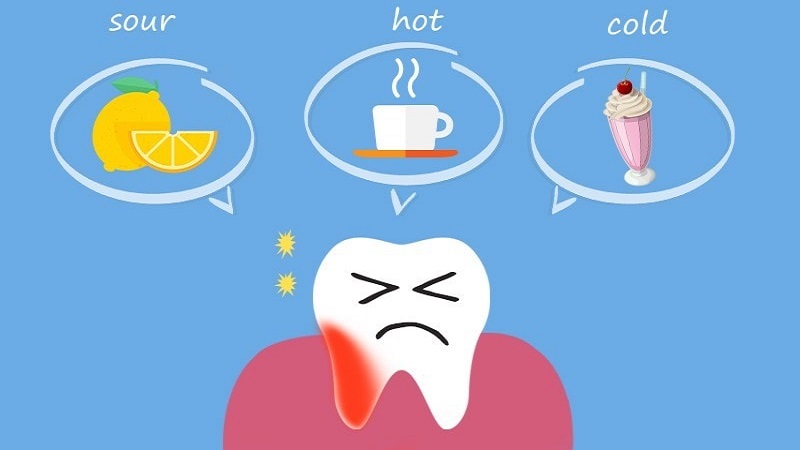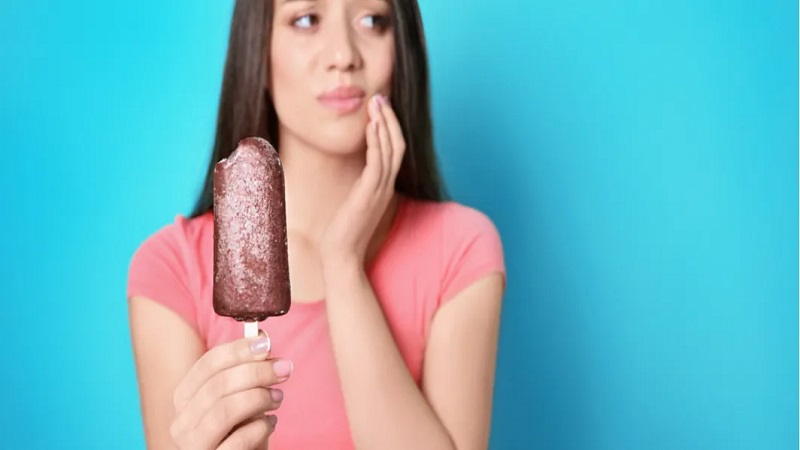How to fix temperature sensitivity after teeth bleaching?
If you face temperature sensitivities after teeth bleaching, take help from the following solutions:
Fluoride treatment: To reduce temperature sensitivity after treatment with Bleaching, you can from Fluoride use. This substance actually helps to calm this sensitivity. In addition, the use of fluoride can be considered the last step of the bleaching process.
If you do not have fluoride available, you can use toothpaste containing fluoride or anti-allergic toothpaste to relieve the sensitivity.. You can get fluoride toothpaste and hypoallergenic toothpaste from all pharmacies and stores related to oral and dental products..
Using this toothpaste can remove the sensitivity caused by bleaching or reduce it to a great extent.
Do you have tooth pain after bleaching?
Minor toothache is only for a day or two after bleaching and then it goes away. This pain is normal and not alarming. But if you have a low pain threshold, the dentist will prescribe anti-inflammatory drugs such as ibuprofen or aspirin.. Because these pills are effective in relieving pain and despite their anti-inflammatory properties, they prevent pain from continuing..
How can I prevent the side effects of teeth bleaching?
The side effects mentioned may occur during treatment or after treatment. But there are solutions to prevent these complications.
-
Taking anti-inflammatory drugs
If you have sensitive teeth and gums, you can inform your dentist about this before starting the treatment process so that he can prescribe anti-inflammatory drugs for you.. Taking these drugs can be effective in preventing inflammation due to bleaching and also reduce pain significantly. While prescribing these drugs, the dentist will explain to you the dosage and how to use them.
-
Hypoallergenic toothpastes
Many dentists recommend that the patient use anti-allergic toothpaste for two weeks before the bleaching treatment.. Because by using this type of toothpaste, the possibility of sensitivity and pain is greatly reduced.
-
Avoid eating very cold or hot foods
It is better to avoid sudden changes in the temperature of your teeth for the first few days after bleaching, so that the sensitivity of the teeth becomes less and less..

View the official Instagram page of Dr. Hossein Borjian.
How long do the effects of teeth bleaching last?
Usually, the side effects of teeth bleaching are short-term and will disappear after a few days. Of course, it should be noted that tooth enamel damage is a serious complication.
Do all people face complications after teeth bleaching?
No, usually people who do not pay attention to the dentist's recommendations and do not consider the post-treatment tips will face complications..
Can bleaching cause gum damage?
Yes, if you leave the bleaching material on the gum tissue for a long time, it will burn and blister..
Does tooth bleaching hurt?
A lot of people who are going to do this procedure are worried about the pain after bleaching. The good news is that this procedure does not hurt.
Teeth pulling after bleaching may occur due to a sudden change in the temperature of the oral environment.
Does bleaching damage teeth?
In normal condition and if it is done according to its principles, no damage is done to the tooth. But if it is used excessively, it may weaken and even damage the enamel.
Why are anesthetics not usually used for bleaching?
You may ask yourself that considering the burning and pain that may occur during the treatment, why does the dentist not use anesthetics? The process of teeth whitening without the use of anesthetics is less risky Why so:
- If the patient's tooth becomes very sensitive during bleaching, the dentist must stop the work before the nerve tissue of the tooth hurts..
- On the other hand, any pain during the bleaching treatment is a sign of oral tissues being impregnated with peroxide and bleaching materials..
If anesthetics are used to prevent pain and irritation, if these issues occur, the patient and the dentist will not notice and continue their work.. Therefore, it is necessary not to use anesthetics to reduce the risk of bleaching treatment.
Ways of communication with the specialized dental center of Najm
View the official Instagram page of Dr. Hossein Borjian.
Contents suggested by Dr. Hossein Borjian (The best dentist in Isfahan–The best gum surgeon in Isfahan–The best cosmetic dentist in Isfahan):
Methods of preventing teeth bleaching complications
Comparison of composite applications and tooth bleaching
The durability of teeth whitening after bleaching treatment



